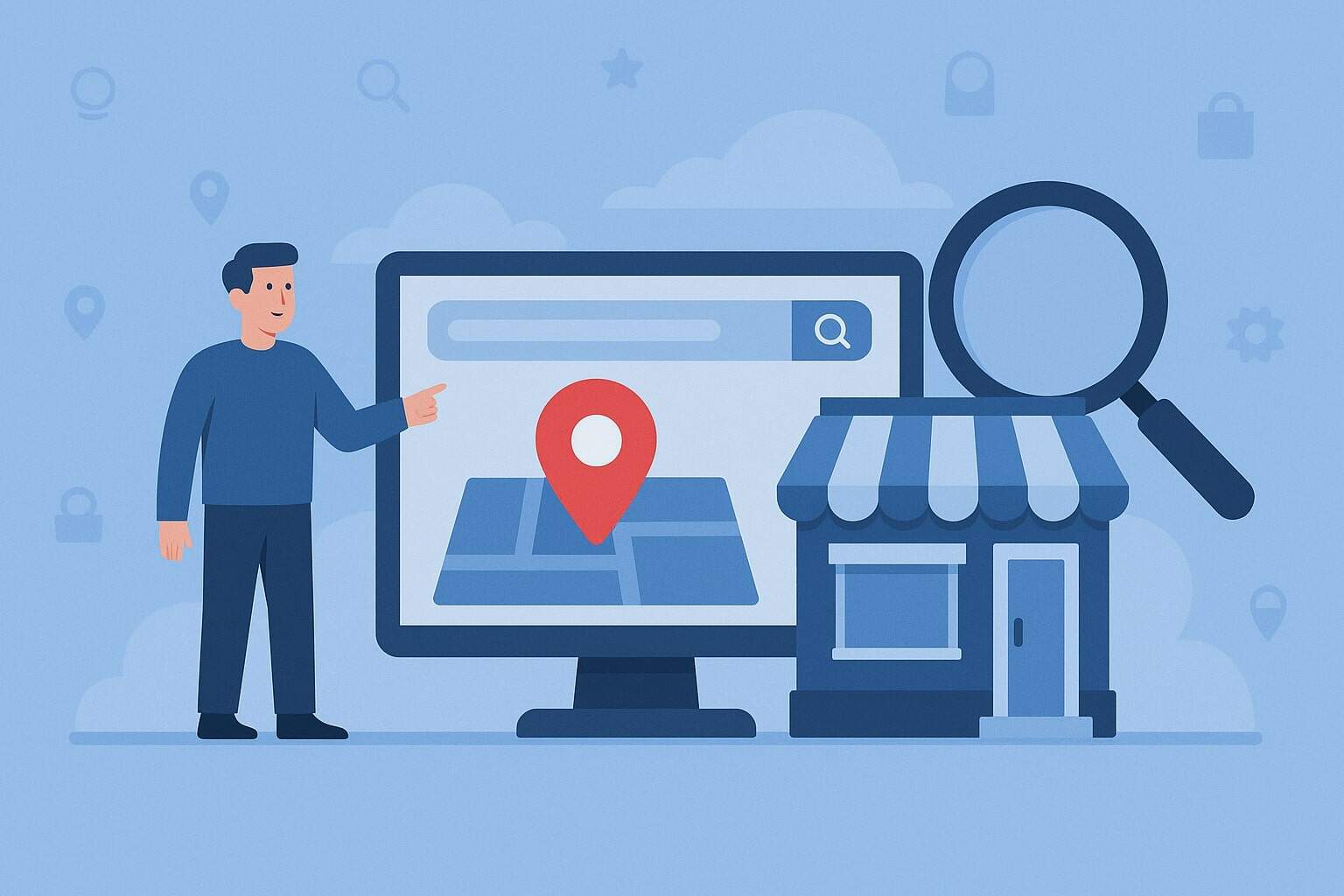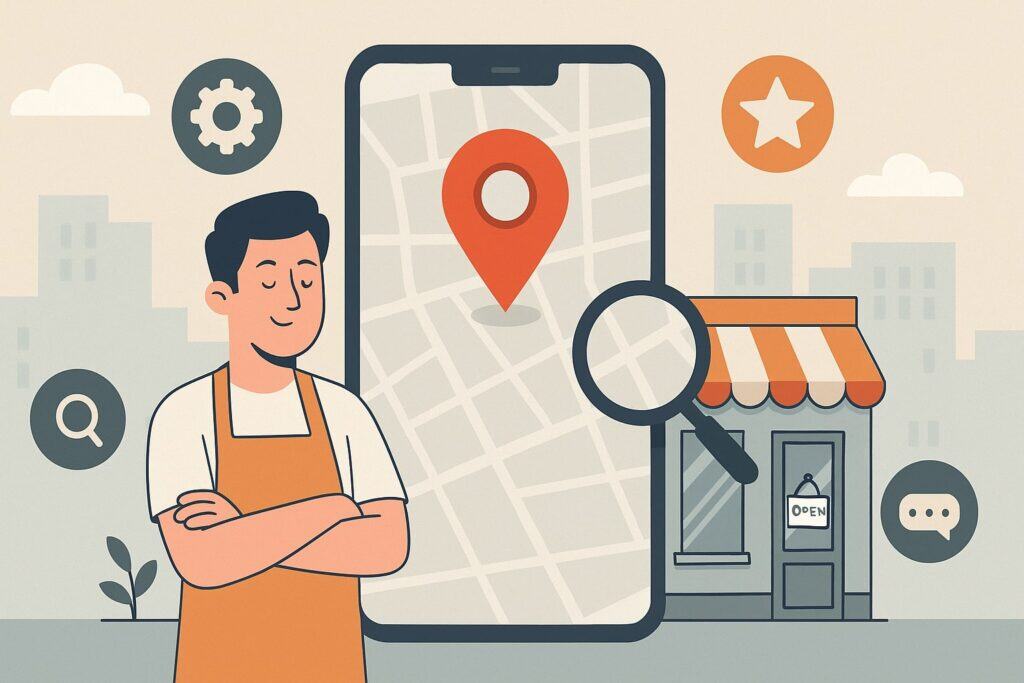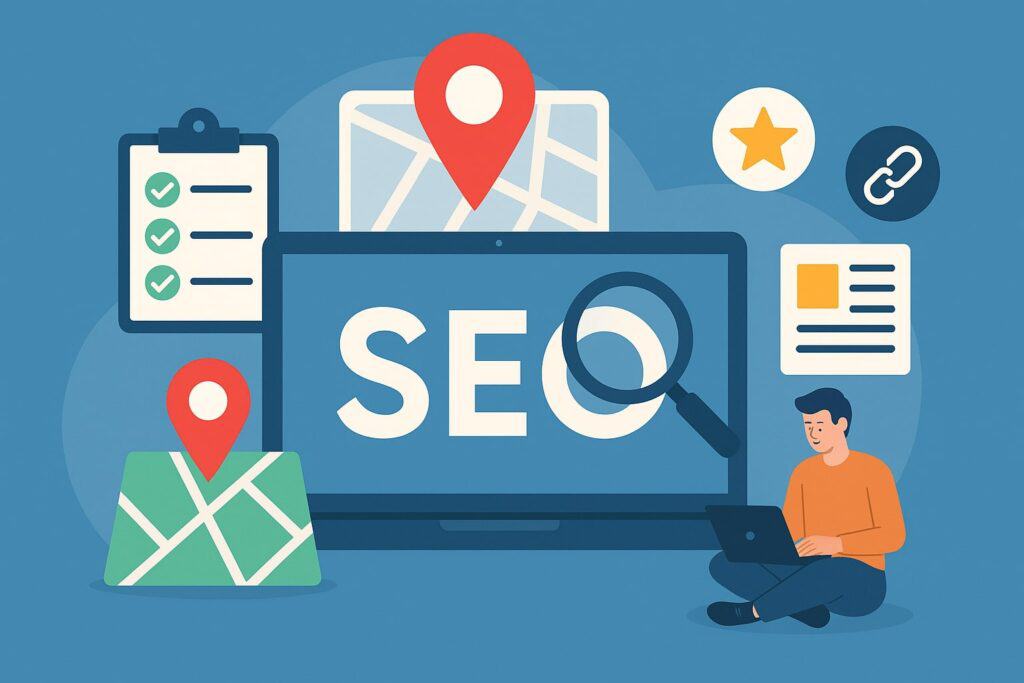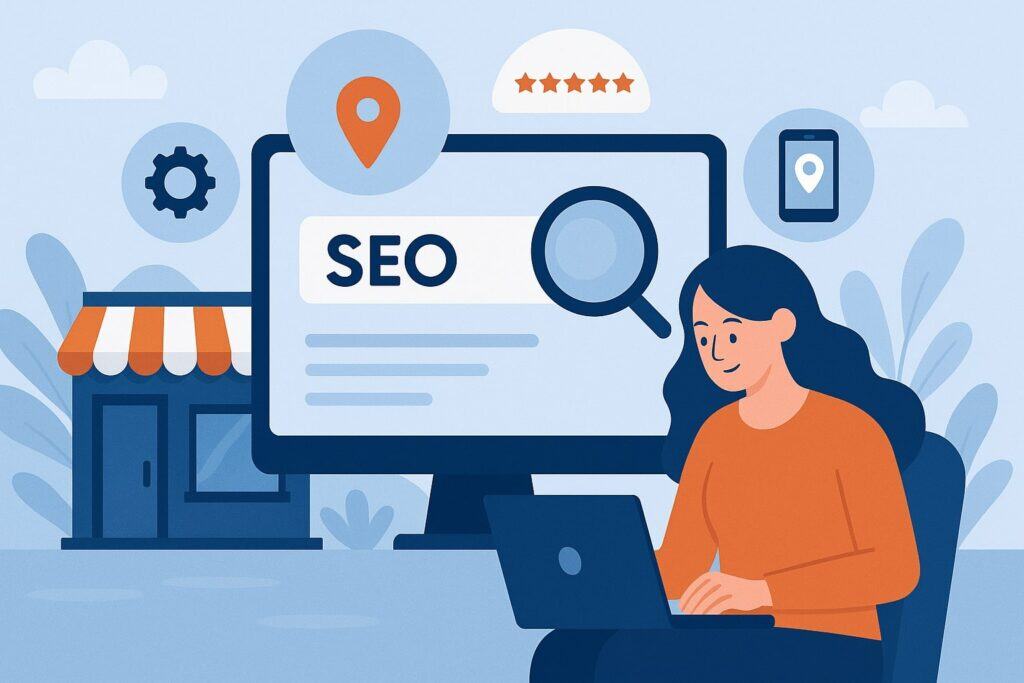
What Is Local SEO and Why It Matters for Small Businesses
Local SEO (Search Engine Optimization) is one of the most important digital marketing strategies for small businesses today. It focuses on improving a business’s visibility in local search results so that nearby customers can easily discover and engage with them.
Unlike general SEO, which often targets a broader or global audience, local SEO emphasizes location-based optimization. This means businesses appear in searches that include geographic identifiers like “near me,” “in [city],” or “[service] nearby.”
For small businesses, local SEO is more than just a marketing buzzword—it’s a proven strategy that connects them with real customers in their community. Imagine owning a bakery in Chicago.
When someone searches for “best bakery near me” or “fresh bread Chicago,” you want your business to appear at the top of Google’s local map pack and organic results. That’s exactly what local SEO helps achieve.
What makes local SEO powerful is its ability to target intent-driven searches. Customers who type location-specific keywords are often ready to purchase, visit, or contact a business. This makes local SEO a high-conversion strategy compared to traditional advertising methods.
In this guide, we will explore what local SEO is, why it’s important, and how small businesses can use it to grow their brand, attract more foot traffic, and generate higher revenue.
From understanding Google’s local ranking factors to optimizing Google Business Profiles, reviews, and citations, this article will serve as a complete roadmap for small businesses looking to dominate their local market.
Understanding Local SEO: The Basics Every Business Owner Must Know
At its core, local SEO is about optimizing a business’s online presence to attract customers from relevant local searches. These searches occur across Google Search, Google Maps, Yelp, Bing Places, and other platforms where consumers look for products or services nearby.
The goal is to ensure that when someone searches for your business category in your area, your company appears among the top results.
Local SEO involves several elements:
- Google Business Profile Optimization – Ensuring your profile (formerly Google My Business) is complete, accurate, and engaging.
- Local Citations – Having your business listed consistently on directories like Yelp, Yellow Pages, and local chamber of commerce sites.
- On-Page SEO – Using location-specific keywords and optimizing your website’s metadata, content, and internal structure.
- Reviews and Reputation Management – Encouraging happy customers to leave positive reviews and responding professionally to negative ones.
- NAP Consistency – Making sure your Name, Address, and Phone number are consistent across all online platforms.
- Localized Content Marketing – Creating blog posts, guides, and resources tailored to your city, region, or community.
For small businesses, this approach is critical because most people today use search engines to find local services. According to Google, 46% of all searches have local intent, and nearly 76% of people who search on their smartphones for something nearby visit a business within 24 hours.
That means if your business isn’t optimized for local search, you are losing potential customers to competitors who are.
Local SEO also helps build trust and credibility. Customers perceive businesses that show up at the top of search results as more reliable. When your company has multiple positive reviews, accurate contact details, and engaging local content, people feel more confident choosing you over another business with little or no online presence.
Simply put, local SEO is not optional—it’s essential. It levels the playing field, giving small businesses the chance to compete with larger companies by targeting specific geographic areas where they operate.
Why Local SEO Is a Game-Changer for Small Businesses

Local SEO matters because it directly impacts how easily customers can find and engage with your business. Traditional advertising methods like print ads, billboards, and radio spots cast a wide net but lack precision.
They reach people who may not even be interested in your services or located nearby. On the other hand, local SEO targets people who are actively searching for your products or services in your area—making it far more cost-effective and impactful.
For example, let’s say you run a plumbing service in Dallas. When someone searches “emergency plumber Dallas” or “24/7 plumbing near me,” Google prioritizes showing local businesses that match the query.
If your website and Google Business Profile are optimized, your business is likely to show up in the Local 3-Pack (the three highlighted businesses on top of the results with a map). This placement significantly increases your chances of being contacted by the searcher.
Here’s why local SEO is a game-changer:
- Drives Highly Targeted Traffic – Instead of attracting random website visitors, you bring in people who are geographically close and ready to buy.
- Boosts Conversions – Local searches often have high purchase intent. Someone searching “coffee shop near me” isn’t doing research; they’re looking for a place to go immediately.
- Improves Mobile Visibility – With mobile searches dominating, local SEO ensures you show up in “near me” searches performed on the go.
- Levels the Playing Field – Small businesses can outrank big corporations in local search by being more relevant, active, and engaging.
- Builds Customer Trust – Reviews, photos, and accurate information make your business appear more reliable.
Local SEO also ties into offline success. More visibility online means more people walking into your store, calling your number, or booking appointments. It bridges the gap between digital discovery and physical sales, making it a critical growth strategy.
Key Elements of Local SEO: What You Need to Focus On

To succeed in local SEO, small businesses must focus on specific ranking factors and optimization strategies. Google uses a unique set of signals to determine local search rankings, and understanding these is key to staying ahead of competitors.
1. Google Business Profile (GBP) Optimization
This is the foundation of local SEO. A well-optimized GBP includes your business name, category, contact information, hours, photos, posts, and even services/products. Regularly updating it with offers, events, and FAQs also boosts engagement.
2. On-Page SEO and Local Keywords
Your website should include keywords that match local search intent, such as “best Italian restaurant in Austin” or “affordable salon near Miami Beach.” Adding city or neighborhood-specific pages can further increase visibility.
3. Local Citations and Directories
Listings on online directories reinforce your business’s legitimacy. Ensure your NAP details are consistent across every platform to avoid confusing Google or potential customers.
4. Customer Reviews and Ratings
Google heavily considers reviews when ranking local businesses. Encouraging satisfied customers to leave feedback not only improves rankings but also attracts more buyers through social proof.
5. Mobile Optimization
Since most local searches happen on mobile devices, your website must load quickly, be responsive, and provide an excellent user experience.
6. Backlinks from Local Sources
Getting featured on local blogs, newspapers, or community websites increases your domain authority and local ranking strength.
7. Engagement Signals
Google looks at how users interact with your profile and website. Metrics like click-to-call, direction requests, and dwell time impact your ranking.
By focusing on these elements, small businesses can build a strong digital footprint that attracts more local customers and enhances their reputation.
How Local SEO Helps Small Businesses Grow

For small businesses, growth depends on attracting new customers while retaining existing ones. Local SEO supports this by expanding visibility, driving traffic, and increasing conversions.
When you show up in local searches, you become the go-to option for people in your community. This leads to:
- More Foot Traffic – Retail shops, restaurants, and salons see more visitors walking in.
- Higher Online Engagement – Customers visit your website, call your business, or follow your social media.
- Increased Sales – More visibility equals more leads, and more leads convert into sales.
- Stronger Community Presence – Being visible locally helps establish you as a trusted neighborhood brand.
Local SEO also fosters long-term growth. Unlike paid ads that stop generating leads once the budget runs out, SEO investments continue to bring in customers over time. The more you optimize and maintain your online presence, the stronger your local visibility becomes.
For example, a small family-owned restaurant in Los Angeles that focuses on local SEO could see its Google profile appear when people search for “authentic Mexican food LA.” With positive reviews, updated menus, and engaging posts, the restaurant not only gains new customers but also builds a loyal local fan base.
Frequently Asked Questions (FAQs)
Q1. What is the difference between local SEO and regular SEO?
Answer: Local SEO is specifically focused on optimizing for geographic-based searches, while regular SEO targets broader, often national or global searches. For example, if you own a dental clinic, local SEO helps you appear in “dentist near me” searches in your area, while general SEO might focus on ranking for “best dental care” without location emphasis.
Both strategies share techniques like keyword optimization and link building, but local SEO adds elements such as Google Business Profile optimization, NAP consistency, and managing online reviews. For small businesses that rely on local customers, local SEO is more impactful because it directly connects them with nearby prospects.
Q2. How long does it take to see results from local SEO?
Answer: Local SEO is not an overnight fix—it’s a long-term strategy. Typically, small businesses begin to notice improvements in local visibility within 3 to 6 months if optimizations are consistent. However, the timeline can vary depending on competition, industry, and current online presence.
Unlike paid ads, which provide instant traffic, SEO compounds over time. As you build citations, earn reviews, and create localized content, your rankings improve steadily. The payoff is sustainable traffic and higher conversions that continue without the ongoing cost of ads.
Q3. Is local SEO worth the investment for small businesses?
Answer: Absolutely. Local SEO offers one of the highest ROIs in digital marketing. With more than half of all searches having local intent, it positions your business in front of people who are ready to buy. Compared to print advertising or traditional marketing, it’s more affordable and measurable.
For instance, a small landscaping company that invests in local SEO may spend less than running weekly print ads but gain steady new clients every month through Google searches. This makes it a cost-effective growth strategy.
Q4. Do I need a website for local SEO, or is Google Business Profile enough?
Answer: While a Google Business Profile is essential, having a website significantly enhances your local SEO performance. A website allows you to publish localized content, attract backlinks, and provide detailed information about your products or services. Google also favors businesses with strong websites when determining rankings.
If you’re just starting, focus on setting up and optimizing your GBP, but plan to build a professional website to maximize long-term growth.
Conclusion
Local SEO is a powerful tool that enables small businesses to thrive in today’s digital-first world. By optimizing your Google Business Profile, managing reviews, building citations, and creating localized content, you can attract more nearby customers and stand out from competitors.
Unlike traditional advertising, local SEO targets people actively searching for your services, which means higher conversion rates and better ROI. For small businesses, it’s not just about being online—it’s about being found by the right people, in the right place, at the right time.
In short, local SEO helps small businesses grow by turning online searches into real-world customers. Whether you run a restaurant, retail store, law firm, or service-based company, investing in local SEO ensures that your business becomes a trusted and visible presence in your community.